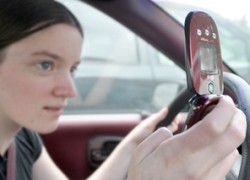
According to the Pennsylvania law firm Edgar Snyder and Associates, around 37 percent of people have sent or read a text while driving. There were over 5,474 deaths attributed to distracted driving in 2009, and young drivers are the most likely to be texting behind the wheel.
On March 8, a Pennsylvania law went into effect that prohibits texting of any sort while driving.
Before the law was even passed, however, researchers at Carnegie Mellon had probed the effects distracted driving has on the brain.
Marcel Just, a senior researcher and professor with the Center for Cognitive Brain Imaging at Carnegie Mellon, looked at people’s brain activities while talking and driving. Just, along with colleagues Timothy Keller and Jacquelyn Cynkar, published their research in the report “A decrease in brain activation associated with driving when listening to someone speak” in the journal Brain Research in 2008.
The brain has many different parts that work simultaneously. “When you’re listening to me talk, for instance,” Just said, “there are 15 to 20 areas of your brain being lit up that are activated. It’s not one place. People say they ‘use frontal lobe’ for this. That’s really a distortion. There is no task that is done by only one part, ever.”
While these processing regions may seem like the most important parts of the brain, they only make up a relatively small part. According to Just, most of our brain is “white matter,” in which a fatty material covers a series of connectors that act as communication wires among the separate regions.
With a viewing screen directly above their eyes, the subjects in Just’s study went through a simulation in which they “drove” a vehicle by moving a hand-held mouse that was situated at their side. While participants were going through their driving course, the researchers occasionally asked them true or false questions, which the subjects would answer by pressing a button in their other hand. A brain scan determined their brain activity by measuring the amount of blood flow to certain regions in the brain.
The results pointed to a clear debilitation of driving while listening; the brain functions that controlled driving decreased by 37 percent. The studies showed that while people were driving, four main regions of the brain were active, primarily those for vision and spatial relationships.
When the drivers had to respond to questions, however, new areas of the brain associated with language processing became active at the same time.
Despite the fact that the regions are largely separate, answering the questions impaired the ability to drive, and Just thinks it is because the white matter — the tissue that connects brain areas — was heavily taxed.
“I think it’s like plugging in an iron and a hairdryer at the same time, causing brownout,” he said. “There are only certain amounts of resources to go around, and if you’re trying to draw on too much, each demand gets a budget cut. In the case of driving, that’s not a good thing to be happening in some situations.”
To combat distracted driving, Just and others believe that policies regulating cell phone use behind the wheel are important. The researcher himself has created a list of ideas, ranging from legislative mandates to applications that shut off one’s phone once it reaches a certain velocity. But he mainly stresses education.
“Nobody really wants to get into an accident and nobody wants to kill an innocent pedestrian,” Just said. “I think we horribly overestimate our cognitive abilities with respect to attention.”
“I think it’s bad,” Just continued. “I don’t think society realizes that it’s bad. It’s not muggers doing this; it’s just people like you and me and our relatives and friends that are talking on the cell phone.”
Some Carnegie Mellon students, like sophomore art major Marie Barcic, agree with the new cell phone law. “You can’t really afford to be distracted while driving,” she said. “You can just pull over if you need to talk to someone.”
Others, like sophomore chemistry major Abigail Burton, think more needs to be done. “I think it’s a step in the right direction, but I think there is a long way to go to make our roads safe from distracted driving,” she said.
Education, Just says, will make the difference. “If people were more aware of how detrimental to their driving performance cell phone usage is, I think many people, just out of a sense of responsibility, would just stop,” he said.
